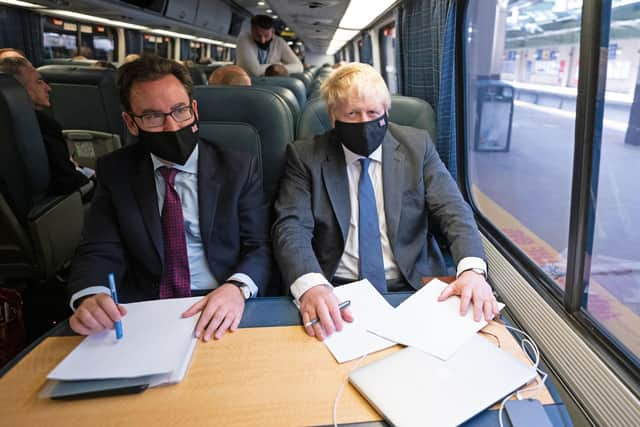Boris Johnson refuses to back down on Universal Credit cuts despite 'difficult winter' warning amid rising energy prices
Business secretary Kwasi Kwarteng said the combination of rising gas prices and the looming £20 a week cut to Universal Credit was a “difficult situation” and he had spoken to Cabinet colleagues, including Chancellor Rishi Sunak, about the pressures facing households.
But the Prime Minister insisted the government’s approach was “the best way forward”.
Advertisement
Hide AdAdvertisement
Hide Ad

Meanwhile, he said the government would take “direct steps” to ensure high gas prices did not lead to empty supermarket shelves, with a deal struck with a firm to avoid shortages in carbon dioxide, which is vital in the food trade.
The Prime Minister told Sky News “Christmas is on” following concerns within the poultry industry about turkey supplies.
Ministers are grappling with a surge in global gas prices which has left energy companies struggling.
Some 4.4 million households on Universal Credit are poised to see their energy bills rise significantly in October – the same month the £20-a-week uplift to the benefits payment ends, the Resolution Foundation think tank has calculated.
The energy price cap is set to rise by £139 a year (12 per cent) to £1,277 for a typical gas and electricity customer from October 1, while the government’s uplift in Universal Credit, intended as a temporary measure during the coronavirus pandemic, ends on October 6.
Pushed on the issue of Universal Credit, Mr Kwarteng told the BBC: “It’s a difficult situation, it could be a very difficult winter.
“That’s why, as energy minister, I’m very focused on helping people that are fuel poor.
“Universal Credit, you will know, is an issue for the Chancellor and the work and pensions secretary. I’m speaking to them a great deal about it.”
Advertisement
Hide AdAdvertisement
Hide AdHe acknowledged there could be families this winter who would have to choose between eating and heating their homes, when pressed on the issue on ITV’s Good Morning Britain.
The business secretary replied: “You’re right, and that’s why I’m very keen to keep the warm home discount and also there are other winter fuel payments that we’re looking at.”
Mr Johnson was challenged over the Universal Credit cut during a BBC interview in the United States, where he is meeting president Joe Biden.
Asked if the decision to reduce the benefit was final, the Prime Minister said: “We think that the best thing we can do is help people into high-wage, high-skilled jobs.
“That is what is happening. Unemployment is falling very rapidly, jobs are being created and wages are rising, and rather than raising people’s taxes to put more money into benefits we want to see companies paying their workers more.”
The rise in energy costs has threatened to disrupt the food supply chain because of a shortage of CO2.
Mr Kwarteng has now struck a deal with fertiliser firm CF Industries, which had suspended operations because of the high cost of energy.
Mr Johnson acknowledged the government had taken “direct steps” to safeguard CO2 supplies, although so far there is little detail of the deal.
Ian Wright, chief executive of the Food and Drink Federation, had warned that shoppers may notice products missing from supermarket shelves “in about ten days”.
Comments
Want to join the conversation? Please or to comment on this article.
